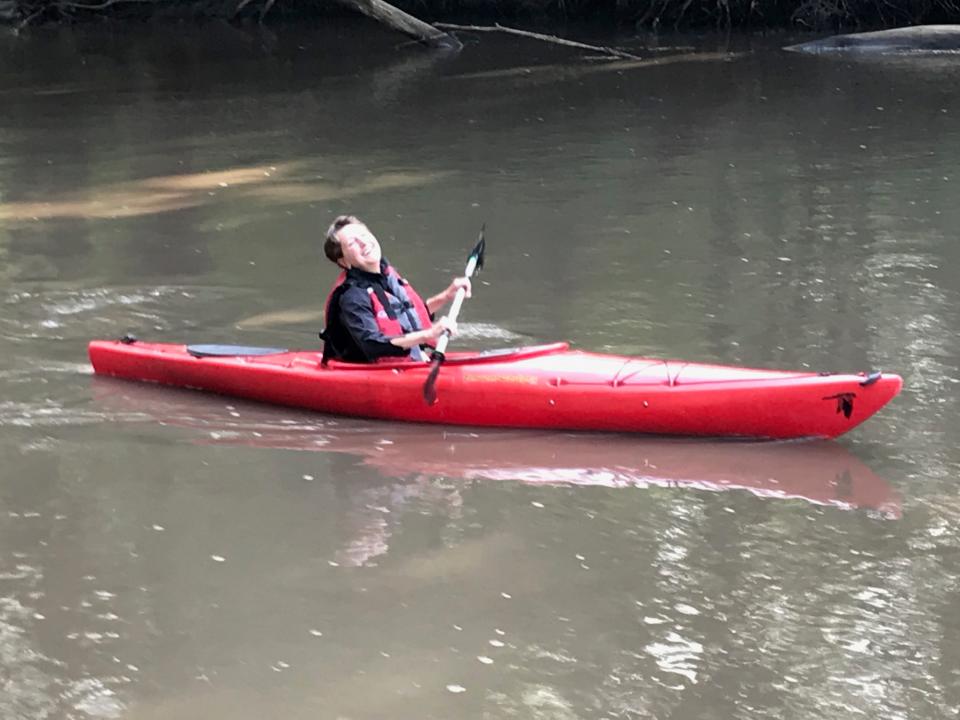‘Stranger’ tourists, Phish and the plague, kinkajou attack: News from around our 50 states
Alabama
Decatur: The city is trying to figure out how to ban guns from a water park were two people were shot. The Decatur Daily reports officials say they need a change in state law before banning visitors from bringing guns into Point Mallard water park. But a state lawmaker from the city says minor changes would allow a gun ban. The issue is a state law that allows weapons at many public venues. A teenager was arrested after two people were wounded during a shooting at Point Mallard in June. City attorney Herman Marks says state law prohibits an outright ban on guns. Republican state Sen. Arthur Orr of Decatur says lawyers tell him the city could prohibit guns if it also controls access and increases security.
Alaska
Juneau: The governor has vetoed additional funding for the state’s ferry service that was placed in the budget by the Legislature. Republican Gov. Mike Dunleavy vetoed $5 million Monday that was added to the Alaska Marine Highway System budget, CoastAlaska reports. The Legislature previously cut $43 million from the ferry system’s budget. A fiscal note attached by the governor’s office called the budget item “premature” ahead of a $250,000 study, due in October, commissioned to reshape the ferry system. “I don’t know how it could be premature,” independent state Rep. Dan Ortiz of Ketchikan says. “We could see that these areas were going to be without needed services.” Coastal residents have told Ortiz they’re prevented from traveling even in emergency situations unless they find airplane travel while facing up to seven months without ferry service, he said.
Arizona
Phoenix: Arizonans spend more time on their phones on average than everyone else in the country, according to a study based off Apple’s screen-time tracking system. SimpleTexting, a text marketing service, used screen-time data from 2,103 survey respondents to show how much of the day users spend tweeting, watching YouTube videos and more. Arizona had the highest average daily screen time at 276 minutes – more than twice the 131-minute average of the lowest state, Oklahoma. Weekly, Arizonans spend an average of 32.2 hours on their phones. That’s roughly 12 hours more than the national average, according to the study. That means that over a year, the state’s residents average about 70 full days using their smartphones.
Arkansas
Little Rock: The governor and attorney general are setting aside $1.5 million to create a legal services clinic for military veterans. Gov. Asa Hutchinson and Attorney General Leslie Rutledge on Tuesday announced they were each allocating $750,000 to create the University of Arkansas Little Rock William H. Bowen School of Law’s Veterans Legal Services Clinic. The clinic is the first of its kind in Arkansas and will enable students at the law school to provide legal services free of charge to veterans throughout the state. Enrolled students will be trained to represent veterans on various legal issues under the supervision of a clinical facilitator. The clinic will also provide free continuing legal education for practicing attorneys on veteran-specific legal issues.
California
Hayward: A 400-pound security robot that was knocked over by a vandal last month in Northern California may help bring its attacker to justice. The Hayward Police Department on Tuesday released images of the suspect that the Knightscope K5 robot captured before it was damaged. The 5-foot-tall robot, described by police as an “R2D2” figure, was guarding a parking garage when it was pushed over Aug. 3. K5’s photos show a young man in a black T-shirt and jeans running up moments before the attack. Police are asking for the public’s help in finding him. The company that built the robot, Knightscope, tells the Fresno Bee that the robot is expected to make “a full and speedy recovery.”
Colorado
Denver: Thousands of people who planned to camp during three days of Phish concerts at a stadium outside the city will no longer be able to because of concerns that fleas in and around nearby prairie dog burrows could spread the plague. The Denver Post reports public health officials are still finding infected fleas in fields surrounding Dick’s Sporting Goods Park in Commerce City. The stadium’s owner decided to ban camping during the concerts over Labor Day weekend, and the band posted the notice on its website Tuesday. Between 2,000 and 3,000 people were expected to camp. The band’s well-known Shakedown Street, where fans sell souvenirs and food, also will not be allowed because the area normally used by vendors outside the stadium is on a dirt road.
Connecticut
Hartford: The state is looking to purchase up to 2,000 megawatts of offshore wind power. The Department of Energy and Environmental Protection says it has released a request for proposals for offshore wind power as required by a new state law. The department says it’s the state’s first solicitation dedicated specifically to offshore wind development, and the timing aligns with a similar offshore wind solicitation by the Massachusetts Department of Energy Resources. Connecticut already plans to purchase about 300 megawatts of offshore wind power from the Revolution Wind project, which is planned for federal waters south of Martha’s Vineyard, Massachusetts. Connecticut Gov. Ned Lamont says the new request represents “the future of the state’s environmental, energy and economic potential.” Bids are due by Sept. 30.
Delaware
Rehoboth Beach: A wealthy developer has won a court battle against neighboring property owners in a fight over oceanfront views from their multimillion-dollar homes. A judge ruled Tuesday that Louis Capano III can build his beachfront mansion in Rehoboth Beach without complying with setback rules that were informally agreed to, but never formally adopted, by his neighbors. The judge noted that while other property owners voluntarily built to those more restrictive setback standards, they tried and failed three times to formally amend the community’s declaration of restrictive covenants. Other property owners complained that Capano’s house will obstruct their own panoramic views of the ocean. They wanted to prevent Capano from building within 30 feet of the coastal construction building line established by state environmental regulators to protect the beach and dunes.
District of Columbia
Washington: The district has enacted emergency regulations to stop the federal government’s plan to house unaccompanied migrant children there. The Washington Post reports the regulations by Mayor Muriel E. Bowser’s administration were adopted Friday and prohibit licensing facilities housing more than 15 residents. They also require the director of the city’s child welfare agency to sign off on facilities housing between eight to 15 children. The rules expire in December. Maryland-based Dynamic Service Solution applied to open a temporary 200-bed shelter in the district. The U.S. Department of Health and Human Services awarded it a $20.5 million contract to operate the shelter for children ages 12 to 17. DHHS has defended the shelter and its treatment of unaccompanied minors.
Florida
Lake Worth Beach: Officials say a small, raccoon-like rainforest creature ran into an apartment and bit a man after he opened the front door to head to work. WPEC-TV reports the kinkajou bit his foot and scratched his leg but didn’t seriously injure him. A woman who witnessed the incident at the Lake Worth Beach apartment said it sounded “like a 300-pound man was tackling him in the kitchen.” Natalie Dulach said the furry mammal with sharp claws clung to the man’s leg as he fought to get it out. The man managed to lock the long-tailed animal in the bathroom until wildlife officers arrived. A Florida Fish and Wildlife Conservation Commission report says the kinkajou was taken to a wildlife facility. Officers didn’t say where it came from.
Georgia
Palmetto: A small-town grocery store has grown in popularity and sold more Eggo waffles than ever in recent years, thanks to Netflix’s “Stranger Things.” Fans of the ’80s-set sci-fi show have sought out filming locations such as the former Bradley’s Big Buy grocery store since the show premiered in 2016. The third season has prompted more fans to visit Georgia, benefiting local businesses. Fans are dressing up as characters, reenacting scenes and taking photos at a grocery store, a mall, downtown Jackson and more. Creators Matt and Ross Duffer set the series in fictional Hawkins, Indiana, but filmed in Georgia, which offers tax breaks and other film industry incentives. A building on Emory University’s Briarcliff Campus in Atlanta served as the show’s Hawkins Laboratory. In Duluth, crews transformed a vacant wing and food court in Gwinnett Place Mall into Starcourt Mall.
Hawaii
Lihue: Officials say an island stream is coming back to life with help from a watershed restoration project. The Garden Island reports the project funded through a state Department of Health grant has produced positive results in the Waipa Stream on Kauai. The effort that began in 2016 aims to remove dense bush from stream banks and surrounding areas while clearing space for native plants. Officials say food forests are taking root, and there is a new swimming hole. The project overseen by the Waipa Foundation has placed fencing around fields to block feral pigs and in pasture land with horses and cows. The fencing keeps the animals out of the water and helps lower bacteria levels below the state threshold for clean streams.
Idaho
Murphy: The largest-ever project in the U.S. to remove thousands of juniper trees to help imperiled sage grouse has started in the state. The Bruneau-Owyhee Sage-Grouse Habitat Project aims to remove junipers on 965 square miles of state and federal land in Owyhee County. Officials say the multiyear project that started this spring could become a template for other western states, as junipers have expanded due to fire-suppression by humans and are taking over vast sagebrush areas and forcing out sage grouse. Sage grouse survival is entirely dependent on sagebrush. Between 200,000 and 500,000 sage grouse remain, down from a peak population of about 16 million. Environmental groups fought the project, contending it was being driven by grazing interests. But federal officials gave final approval earlier this year.
Illinois
Springfield: New security measures will be put in place next month for tours of the governor’s mansion. State Police acting director Brendan Kelly says starting Sept. 3, individuals will have to sign up in advance for tours, provide a photo ID for proof of identity when they arrive, and be screened by metal detectors. Kelly says the measures, adopted after a review of other states’ mansion tour policies, show a commitment to giving mansion guests a safe and welcoming experience. The mansion reopened last year after renovations that cost $15 million. Former Gov. Bruce Rauner spearheaded the renovations because maintenance had been deferred for years. Officials say thousands have visited the mansion since it reopened.
Indiana

Indianapolis: Larry Bird likes the mural but not the tatts. An artist says she’ll remove most tattoos from a large painting of the former NBA star on a multifamily residence in the city. The tattoos include two rabbits mating on his right arm and a spider web on a shoulder. Artist Jules Muck says she was just trying to be funny. The mural is a replica of Bird’s appearance on a 1977 Sports Illustrated cover when he played college ball for Indiana State. Bird’s attorney, Gary Sallee, says the former Indiana Pacers executive “needs to protect” his brand and “doesn’t want to be seen as a tattooed guy.” Muck says an “Indiana” tattoo will remain on Bird’s arm in the mural.
Iowa

Johnston: The first waterway access point of the Central Iowa Water Trails project opened Tuesday, with the inaugural launch for a new carry-down access site on Beaver Creek. Entering the creek before the access point was constructed was difficult, Mayor Paula Dierenfeld says. “You used to have to drag a canoe across leaves and mud ... but, now, that’s all changed,” she said. As part of the ceremony, Dierenfeld was one of the first to hit the water in a kayak – something she had never done before, she said as she was getting in. She’s previously only been in canoes. The mayor was also given a ceremonial paddle with “Johnston” inscribed on it. Johnston approved the $350,000 plan last year to build the boat ramp. Next year construction will launch on an access point near Terra Park. The overall project plan is to transform 150 miles of waterways in central Iowa into a recreational amenity.
Kansas
Kansas City: The struggling Kansas City T-Bones baseball team is being evicted from its stadium because of unpaid debts. The Unified Government of Wyandotte County/Kansas City Kansas announced Monday that it’s ending its management agreement with the T-Bones and has given the team until Sept. 13 to remove all its property from the publicly owned stadium. The government said in a news release that the T-Bones owed a total of nearly $763,000 in current and past-due utility bills and past-due payments for use of the stadium. The Unified Government said it intends to pursue all remedies to collect the debt. The T-Bones are part of the American Association of Independent Professional Baseball and not affiliated with Major League Baseball.
Kentucky
Frankfort: Two Democratic lawmakers say they have a proposal that would eventually more than double the state’s minimum wage. Sen. Reggie Thomas of Lexington and Rep. Kathy Hinkle of Louisa say they’ll introduce the measure in the House and Senate during the 2020 session, and it would gradually raise the state’s minimum wage until it reaches $15 an hour by 2027. The lawmakers say the increase would result in a livable wage for more Kentuckians. Hinkle says the bill is aimed at helping people now juggling two or three jobs to support their families. The minimum wage in Kentucky is $7.25 an hour. Their bill would not apply to businesses with annual gross revenues under $500,000. Previous efforts to raise the minimum wage have died in the Legislature.
Louisiana

Livingston: U.S. Rep. Garret Graves says Livingston Parish will receive a $5.3 million federal grant to fund the elevation of 88 homes that were substantially damaged during the 2016 flood. Graves says the money is part of the $300 million in federal hazard mitigation funds he worked to secure in the months after the flood. Officials say that money is part of the overall $3 billion in federal funding for Louisiana flood protection and drainage improvements. WAFB-TV reports Livingston Office of Homeland Security and Emergency Preparation Director Mark Harrell said all of the 88 properties will be elevated above the Base Flood Elevation and in compliance with local building ordinances.
Maine
Augusta: The National Endowment for the Humanities is going to help a pair of cultural institutions engage more with the public about the state’s bicentennial. U.S. Rep. Chellie Pingree says the funding is going to the Maine Humanities Council and the University of Maine, Augusta, both slated to receive $100,000 for public discussion programs. Pingree says the grants will help “lift up diverse voices and increase access to cultural programming for all Mainers.” The Maine Humanities Council plans to use its funding to support programming for Maine’s bicentennial celebration next year. UMA’s funds will help with a 15-part speaker series called “Maine’s Midcentury Moment” that will also be a part of the university’s bicentennial programming.
Maryland
Annapolis: Scientists in the state have been warning of a growing “dead zone” in the Chesapeake Bay. Now the numbers are in, confirming their dire warnings were correct. Natural Resources Department data shows an area with little to no oxygen spread to 2 cubic miles by late July, making it one of the worst in decades. By comparison, July dead zones averaged about 1.35 cubic miles for the past 35 years. The worst section includes the lower Potomac and Patuxent rivers and much of the bay, from Baltimore to the mouth of the York River. University of Maryland environmental scientists say heavy rains washed wastewater and agricultural runoff into the bay and produced oxygen-stealing algae. Scientists fear it could harm crabs, oysters and the state’s seafood industry.
Massachusetts
Worcester: A state public transit agency is considering a fare-free bus system. The Telegram & Gazette reports the Worcester Regional Transit Authority Advisory Board voted unanimously last week to conduct a fare analysis that includes consideration of a fare-free system. In a report in May, The Research Bureau called the WRTA “a perfect candidate” for a fare-free bus system. The report calculated that the $2 million to $3 million annual cost to provide free service could be made up through cost savings, increased governmental aid and partnerships. The report said offering the service for free would reverse the system’s declining ridership. WRTA Administrator Dennis Lipka says to go fare-free, “we have to find a sustainable way of making that up,” and one-time grants would not be sufficient.
Michigan
Empire: Sleeping Bear Dunes National Lakeshore has welcomed its 50 millionth visitor. The National Park Service says other visitors applauded when Meghan Boertman entered Sleeping Bear’s visitor center in Empire, in northern Michigan west of Traverse City. She was joined by her husband, Spencer, and their children, Jacoby and Levi. It was the first visit for the Boertmans, who live in Norton Shores, near Muskegon. They received an annual park pass, along with a plush black bear, souvenir books and a DVD. Officials say the milestone comes a year ahead of Sleeping Bear National Lakeshore’s 50th anniversary. Visitor statistics are culled from road, visitor center and campground counters as well as North and South Manitou islands.
Minnesota
St. Paul: The state’s film and TV production incentive program is changing after questions were raised about past awards, including $267,000 for Jimmy Fallon’s “Tonight Show.” Minnesota Public Radio News reports the board that runs the Snowbate program announced the changes Monday. Awards would not go to shows built around a national event in Minnesota, nor to projects featuring political candidates. The idea is to fund projects that rely most on in-state workers or feature Minnesota prominently. MPR reported last month that some Minnesota Film and TV board members had questioned the rebate for Fallon’s show to come to Minneapolis during the 2018 Super Bowl. Questions were also raised last fall about a documentary on politician Ilhan Omar.
Mississippi
Oxford: The University of Mississippi will open a new $32 million campus recreation center this month. The center will include workout space, an indoor climbing wall, fitness studios, basketball courts and other facilities. It’s in a former warehouse of a Whirlpool appliance factory that closed in 2009. Ole Miss began construction in 2016. Campus recreation director Peter Tulchinsky says the new center will accommodate a student population that has doubled since 1983, when Ole Miss opened the Turner Center, its existing recreation facility. The Turner Center will remain open. Ole Miss is basing its parking and transportation department at the center south of Mississippi 6, creating a bus hub and a 700-space parking lot. The center is free for students. Faculty, staff, alumni and community members must buy memberships.
Missouri
Jefferson City: A judge has temporarily blocked a new state law that sought to shield large hog, poultry and cattle farms from stringent local health rules. Cole County Presiding Judge Patricia Joyce’s action means the measure won’t take effect as scheduled Aug. 28. Critics of the law have requested it remain on hold through a Sept. 16 court date. If implemented, it would prevent local officials from passing more stringent regulations than the state on large farms. It’s directed at protecting the interests of industrial farms known as concentrated animal feeding operations, which can produce beef, pork, poultry, dairy and eggs more efficiently than traditional farms can but also stoke concerns about air and water pollution.
Montana

Two Dot: U.S. Forest Service officials have reached a deal with a landowner meant to increase public access to the eastern side of the Crazy Mountains. The Great Falls Tribune reports the Forest Service will allow landowner Mac White motorized access across public land to reach isolated parcels he owns. In return, the Forest Service will get an easement to build a trail into the Helena-Lewis and Clark National Forest. That will allow access from the eastern side of the southwestern Montana mountain range into the remote Big Elk Canyon. The Bozeman Daily Chronicle reports that work will also begin on a new trail on the western side of the Crazy Mountains next week. The project is meant to reroute and replace parts of a trail where access had been in dispute.
Nebraska
Lincoln: Officials are moving 24 teenage girls out of a state-run facility for female juvenile offenders after learning that many were confined to buildings with fire hazards, holes in the wall, and mold and water damage. The Department of Health and Human Services announced the move Monday after some state lawmakers voiced concerns about the conditions and a lack of staff and programming at the Youth Rehabilitation and Treatment Center in Geneva. The campus in rural central Nebraska serves as a rehabilitation center for girls ages 14-18 who have broken the law and been rejected by other private treatment facilities. All of the 24 girls who live on campus were sent there by the courts as a last resort, and many have significant behavioral and mental health problems.
Nevada
Reno: The Burning Man Project has announced it will be hosting a ticketed conference in the city next year. The May 6-9 conference, dubbed “Learning Man,” aims to explore how Burners can “build bridges between our realities and work to create a better world.” Tickets will go on sale in October. The organization has not released the ticket pricing, nor the location of the conference, but says it will be far from a boring, nametag convention. More than 1,500 creators, connectors and cultural ambassadors from the Burning Man community and beyond will gather to “ideate, learn, build networks, and support thriving year-round communities made stronger by their intelligent and conscious integration of Burning Man culture,” a statement says.
New Hampshire
Derry: Town officials are trying to figure out how a recently opened time capsule from 50 years ago has nothing in it. Library director Cara Potter tells WMUR-TV that since she started there five years ago, the safe has been sitting on a shelf. Before that, it was kept at the old municipal building in town. The combination was on the back of the safe. Potter said it took several tries to get it open recently on the 50th anniversary of when it was sealed in 1969. But it was empty. No one has a list of what was originally put inside. Officials said they have no idea who could have opened it and taken the items. They even speculated that nothing was put in there in the first place.
New Jersey

Newark: A young girl discovered something slithery at an airport security checkpoint – a 15-inch-long snake. Transportation Security Administration officials at Newark Liberty International Airport said in a release that it appears the thin, black snake with a yellow ring around its neck was forgotten by a traveler Monday night. The girl alerted a TSA officer, and a gray checkpoint bin was placed over the snake that officials said was harmless. Officials closed the security lane temporarily, and Port Authority police took the snake away. New Jersey Federal Security Director Tom Carter says Newark has a robust lost-and-found system, but the owner of the snake should not call them or expect to be reunited with the reptile. It’s unclear where the snake was taken.
New Mexico
Santa Fe: A new report says the state is now on track to collect an unprecedented $7.8 billion in the budget year thanks to skyrocketing oil production. According to the Albuquerque Journal, the report says total state revenue collections were roughly $273 million above projected levels through April largely because of oil production in southeastern New Mexico. The higher-than-expected revenue surge for the budget year that ended June 30 could allow for additional spending increases on public schools, roads and other programs. Legislative and executive economists will release new official revenue estimates at a legislative hearing in Red River later this month. New Mexico was already expecting a $1.3 billion budget surplus for the fiscal year.
New York
New York: A landmark Pepsi sign along the East River will also promote JetBlue for the next six weeks, and critics are finding it hard to swallow. An illuminated blue logo advertising the airline was added to the 60-foot Pepsi-Cola sign in Long Island City, Queens, this week. The new signage celebrates a partnership in which JetBlue will serve PepsiCo drinks on flights. The city Landmarks Preservation Commission issued a permit for the JetBlue logo through Oct. 1. But City Councilman Jimmy Van Bramer, a Democrat who represents the area, says some constituents are complaining. Van Bramer says that even a temporary JetBlue sign “shouldn’t be there.” Nancy Rooney, a PepsiCo vice president of marketing, says the iconic Pepsi-Cola sign is “the perfect symbol” to celebrate Pepsi’s JetBlue partnership.
North Carolina
Raleigh: Legislation that prohibits production and possession of smokable hemp next year while laying regulatory groundwork to expand the state’s industrial and medicinal hemp industry has cleared a second legislative chamber. The state House voted 63-48 on Wednesday for the General Assembly’s annual farm bill. Smokable hemp lacks the concentration of the compound that gives marijuana its high. But law enforcement wants smokable hemp banned because it looks and smells the same – making it otherwise impossible to differentiate during police stops. House members defeated an amendment to delete the proposed May 1 smokable hemp ban. Hemp growers say smokable hemp is an emerging moneymaker for them. The bill now returns to the Senate, where a version already passed, but the measure’s top backer wants the ban delayed until next June.
North Dakota
Bismarck: Lawsuits from environmentalists and landowners have made investors skittish and delayed progress another year on the proposed $800 million oil refinery near Theodore Roosevelt National Park, the developer’s top executive says. Meridian wants to build the refinery just 3 miles from the state’s top tourist attraction, drawing more than 700,000 visitors annually. Environmental groups argue pollution from the factory will spoil scenery and air quality at the 30,000-acre park. Meridian began site work last summer, aiming to have the Davis Refinery operating by mid-2021. Meridian Energy Group CEO William Prentice says the company now plans to have the factory running in 2022 due to funding and legal setbacks. Securities filings show the company has raised less than 5% of construction costs. And the company has two disputes pending before the state Supreme Court.
Ohio

Dayton: Comedian and Buckeye State native Dave Chappelle is coming home to host the Gem City Shine block party from 4 to 10 p.m. Sunday. The Oregon District Benefit Concert and Community Event will be hosted by the Yellow Springs native. The Oregon District is where a shooter killed nine people Aug. 4. Local and national entertainment will be featured on the main stage during the block party, according to a release. The event will be used to honor the lives of people lost and “reclaim the community’s favorite places to shop, dine and enjoy time with family and friends,” according to the news release from Downtown Dayton Partnership. There will be opportunities at the block party to donate to The Dayton Foundation’s Oregon District Tragedy Fund and the Oregon District Business Association.
Oklahoma
Norman: A judge is expected to rule next week on whether consumer products company Johnson & Johnson helped fuel the state’s opioid epidemic in the first such case against a drugmaker to go to trial. A court spokesman says Cleveland County District Judge Thad Balkman is expected to read his decision in open court at 3 p.m. Monday. Before the six-week trial began May 28 , two other groups of defendants who manufactured opioid drugs reached settlements with Oklahoma. The state claims the companies helped create a public nuisance by aggressively marketing painkillers and downplaying the risk of addiction. The state estimates it will cost as much as $17 billion to abate the crisis. Attorneys for the company maintain they acted responsibly and followed strict industry regulations.
Oregon
Portland: A free legal assistance program for immigrants in the city has provided nearly 350 people with lawyers to represent them in deportation hearings in its first year. The Oregonian/OregonLive reports the program called Universal Reception also helped at least 105 people apply for refugee status. Portland’s City Council approved the service last year and put $500,000 toward its budget from property tax collections. This year, Multnomah County allocated $290,000 to the initiative, and the state approved an additional $2 million to expand the service statewide – the first state to do so in the nation. The people who have received free legal services through the program come from Colombia, El Salvador, Ethiopia, Guatemala, Honduras, Iran, Iraq, Mexico, Nicaragua, Russia, Ukraine and Venezuela.
Pennsylvania
Harrisburg: A committee of Pennsylvania Game Commission staff has recommended a statewide ban on feeding white-tailed deer. The agency biologists say that banning artificial feeding stations would help slow the spread of wildlife diseases. They’re asking residents to voluntarily stop feeding deer. The commission often addresses wildlife outbreaks of insect-borne infections, West Nile virus and other flare-ups, but its scientists are most concerned about chronic wasting disease in deer. The neurological disorder is fatal, and exposure cannot be detected until shortly before the deer’s death. The disease has spread to herds in 23 states. The Pittsburgh Post-Gazette reports that municipalities that have proposed feeding bans in the past have faced opposition and eventually abandoned the idea after backlash from voters who enjoy the pastime.
Rhode Island
Providence: The state ethics commission has decided to open a formal investigation into Democratic Gov. Gina Raimondo’s dealings with the company that runs the state’s lottery. The Rhode Island Republican Party filed a complaint. WPRI-TV reports the commission voted Tuesday to open the investigation. Brandon Bell, special counsel for the party, alleges Raimondo violated state law by negotiating and entering into a tentative agreement with International Game Technology to extend its services until 2043 without going through a competitive bid process. Jonathan Berkon, a lawyer for Raimondo, says they’re confident the commission will find this “latest partisan complaint has no merit.” Raimondo and legislative leaders announced the proposed terms in June. The deal needs legislative approval.
South Carolina
Charleston: Population growth and crowded highways have paved the way for a passenger ferry service in the area that’s expected to begin in October. The Post and Courier reports the Daniel Island Ferry is expected to carry up to 49 passengers from a Wando River dock near Children’s Park on Daniel Island to the Charleston Peninsula. There will be stops at the Charleston Maritime Center and Joe Riley Waterfront Park. It won’t be the first time Daniel Island residents have been able to commute by boat to the peninsula, but it would be the first regular commercial ferry service the area has seen in decades. Last year, Charleston Water Taxi temporarily offered a commuter schedule when the James B. Edwards Bridge between Daniel Island and Mount Pleasant was shut down.
South Dakota
Rapid City: The city is expected to lose more than $2 million in state funding over the next two years following the congressional repeal of South Dakota’s tax on internet service. The 2016 Permanent Internet Tax Freedom Act, which required the state to stop taxing internet services by mid-2020, is projected to lead to a $700,000 loss in state funding next year and $1.4 million the following year for Rapid City. The South Dakota Municipal League estimates it will result in a total revenue dip of $7 million to $10 million for all of the state’s municipalities by 2021. The tax applies to retailers that conduct more than $100,000 worth of business in South Dakota annually or more than 200 transactions a year.
Tennessee

Townsend: The Great Smoky Mountains National Park has received what it calls a “priceless” donation of Cades Cove artifacts. The cove was a thriving community before the National Park Service began purchasing the land in 1927. Dan and Sidney Lawson were two of its residents. According to the park, Dan Lawson led singing at the Methodist Church, and Sidney Lawson helped to educate children in the cove. Their cabin is preserved as part of the Cades Cove Historic Landscape. Now their great-granddaughter Robin Derryberry, of Chattanooga, has donated a handmade dresser, a family Bible, and wedding and other portraits. Derryberry says her family wants the items to be in a place where they can be enjoyed by the public and preserved for future generations.
Texas
Corpus Christi: NASA is flying drones over the city to test the safety of the unmanned devices in a dense urban environment. The tests this month in Corpus Christi are part of a four-year project with the Federal Aviation Administration to develop a national drone traffic management system. NASA says in a news release that the drones are flying at altitudes between 200 and 400 feet. It says a city presents obstacles that can reduce line of sight and hinder communication. Urban weather conditions can hamper flight, and cities often lack safe landing options. NASA spokesman Darryl Waller said Tuesday that the agency is gathering and reviewing data with the aim of addressing these issues. He said the Corpus Christi testing has gone well and will conclude Friday.
Utah
Salt Lake City: The Church of Jesus Christ of Latter-day Saints is reminding members that coffee is prohibited no matter how fancy the name, that vaping is banned despite the alluring flavors and that marijuana is outlawed unless prescribed by a competent doctor. The new guidance in the August issue of a youth magazine for members of the Utah-based church doesn’t include any fundamental changes to the religion’s strict health code. But the significant clarifications seem to reflect growing concern about young Latter-day Saints’ adherence to the rules. The article says it aims to clarify issues that could be confusing to young people about the religion’s “Word of Wisdom,” a set of rules about foods and drinks. The article warns that drinks with names that include the terms cafe, caffe, mocha, latte or espresso or that end in -ccino usually have coffee in them.
Vermont
Rutland: The Vermont Agency of Transportation is planning to start a program to provide residents in recovery with transportation assistance. Ross MacDonald, public transit coordinator for the agency, says the program will be first introduced in Rutland and the Northeast Kingdom and will work in cooperation with recovery centers and transportation providers. The goal is to help residents having trouble getting to treatment appointments or to and from their employment. The Rutland Herald reports the recovery centers will contact the regional transit center for clients to see if any trip costs are covered through eligible health care programs. If it is not covered, the recovery center will use its allocation and budget to pay for the trip. The Federal Transit Administration has provided $160,000 to fund the program.
Virginia
Norfolk: The city is suing the state in an attempt to remove an 80-foot Confederate monument from its downtown. The city of Norfolk’s suit, filed in federal court, targets a Virginia law that prevents the removal of war memorials. The suit claims the city’s free speech rights are being violated because it’s being forced to project a message it no longer supports. The 1907 monument was erected at a time when the South was being romanticized and slavery was de-emphasized. Council members voted in 2017 to move the monument to a cemetery. University of Virginia law professor Richard Schragger said Norfolk is employing a relatively novel and untested legal strategy in federal court. The main legal question is whether cities have free speech rights.
Washington
Seattle: A new federal lawsuit seeks to establish a “protection zone” for endangered orcas in the Pacific Northwest. The Center for Biological Diversity and the Orca Relief Citizens’ Alliance sued NOAA Fisheries in U.S. District Court in Seattle, saying the agency has failed to act on a petition it filed in 2016 that sought to bar vessels from a 10- to 12-square-mile area west of San Juan Island where the orcas feed from April through September each year. Canada has already announced that no vessel traffic will be allowed from June through October in three sanctuary zones in prime orca feeding habitat. Advocates say vessel noise interferes with the echolocation the orcas use to hunt. The whales are struggling with a dearth of their preferred prey, Chinook salmon.
West Virginia
Charleston: Can a governor be forced to live in the capital city? A persistent lawsuit seeking to do just that with Gov. Jim Justice was back in a courtroom Wednesday. The Republican billionaire has been frequently criticized by members of both major parties for being absent from the statehouse. A Democratic lawmaker’s lawsuits have accused Justice of violating a passage of the state Constitution that says the governor “shall reside at the seat of government.” The result has been a legal back-and-forth on the definition of the word “reside.” There are also issues on the authority and ability of the courts to chaperone the whereabouts of the state’s chief executive. Wednesday’s hearing rehashed some of those questions. After a short discussion, a circuit court judge extended the case by asking for more documents from Justice’s legal team and Del. Isaac Sponaugle, who filed the suit.
Wisconsin
Milwaukee: The Milwaukee Bucks now have an official team chocolate milk. The Bucks and the state’s cult-favorite gas station and convenience store Kwik Trip partnered up on the chocolate milk, the pair announced in a news release Wednesday. The chocolate milk with a green label and Milwaukee Bucks logo will be available at all Wisconsin Kwik Trip locations beginning Oct. 1. The team’s official milk will also be served at the Bucks’ training center and the Froedtert & the Medical College of Wisconsin Sports Science Center. The 16-ounce bottles come in 1% and whole milk. The milk comes from Kwik Trip’s Nature’s Touch brand. Kwik Trip is also becoming the presenting partner of Bucks Sundays at Fiserv Forum during the 2019-20 season.
Wyoming
Casper: A draft bill has been passed that would make it easier for indigenous people in the state to vote. The Casper Star-Tribune reports the state’s Select Committee on Tribal Relations passed draft bill language Monday and asked the Corporations, Elections & Political Subdivisions Committee to sponsor the legislation this fall. State lawmakers say the proposed bill would allow driver’s license numbers and Social Security numbers to be printed on tribal ID cards, allowing tribal citizens to use one card when registering to vote. Officials say federal law states a tribal ID can currently be used to vote if presented with a driver’s license number or the last four digits of a Social Security number.
From USA TODAY Network and wire reports
This article originally appeared on USA TODAY: News from around our 50 states

